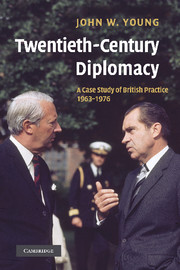Book contents
3 - The diplomatic machine
Published online by Cambridge University Press: 30 June 2009
Summary
When you disgrac'd me in my embassade,
Then I degraded you from being King …
Alas, how should you govern any kingdom
That know not how to use ambassadors …?
William Shakespeare, Henry VI, Part Three, Act Four, Scene ThreeIf a country's diplomatic machine is to be put to good use, how should its purposes be defined, how should it be resourced and what is its most efficient organisation? Reform of the British system was a regular event. In 1919 the Diplomatic Service, made up of staff serving abroad, was merged with the Foreign Office, whose staff had, since its creation in 1782, seldom ventured overseas. The new service was then itself merged in 1943 with the Consular Service and Commercial Diplomatic Service. Ministries, too, were fused as external circumstances changed. Thus, in 1947, when India became independent, the India Office joined the Dominions Office to form the Commonwealth Relations Office (CRO). The 1960s and 1970s proved a particularly significant period for institutional reform and for questions being raised about the purpose of the country's representation abroad. On the institutional side, in 1964 a separate Ministry of Overseas Development (ODM) was established by Wilson; in 1966, with most colonies now independent, the Colonial Office amalgamated with the CRO to form the Commonwealth Office; and only two years later this merged with the Foreign Office to create the Foreign and Commonwealth Office (FCO).
- Type
- Chapter
- Information
- Twentieth-Century DiplomacyA Case Study of British Practice, 1963–1976, pp. 31 - 58Publisher: Cambridge University PressPrint publication year: 2008



